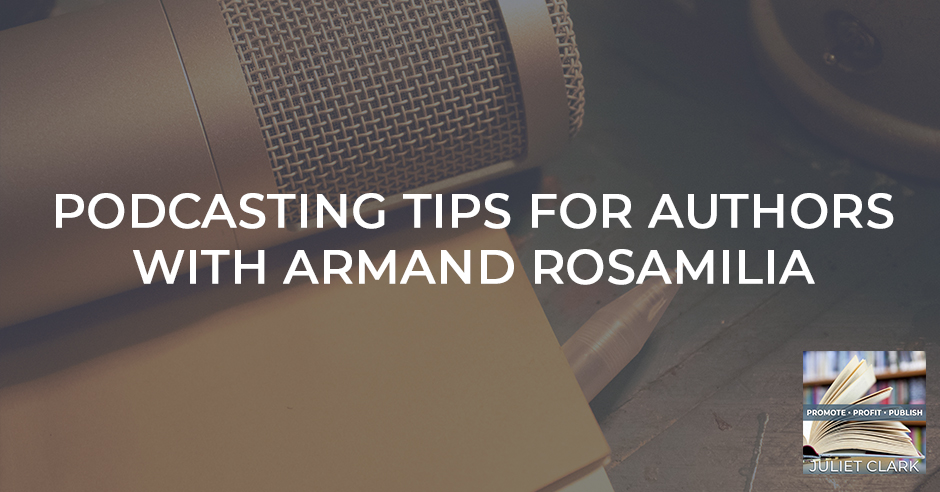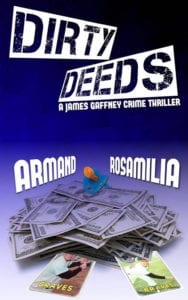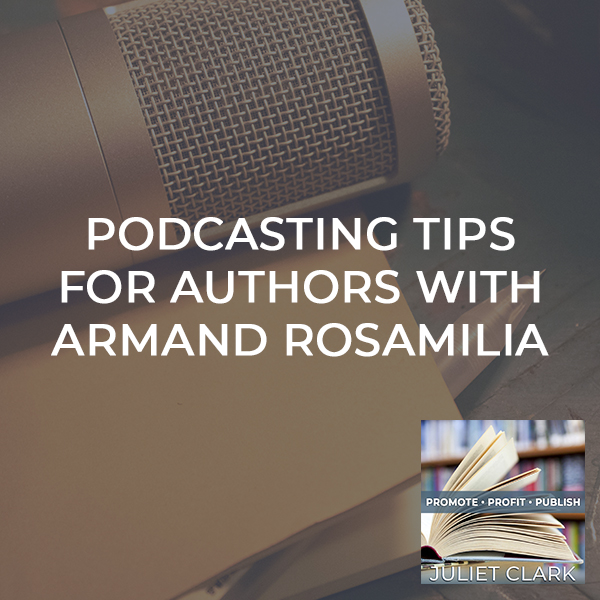
Podcast is the truly the fastest growing medium today. In this episode, Juliet Clark interviews Armand Rosamilia, a full-time author of crime thrillers, horror, and more and the host of two podcasts – Arm Cast Podcast and The Mando Method Podcast. Podcasting, when produced with accuracy, can become so influential in delivering niche information and engaging people easily. Armand shares some podcasting tips that he applies to lure more audience and to manipulate the Amazon bestseller list. He also reveals how fiction authors can monetize through podcasting.
—
Watch the episode here
Listen to the podcast here
Podcasting Tips For Authors With Armand Rosamilia
Our guest is a little bit different. I found him over on LinkedIn and he is a fiction author like me. We have 150 ways to kill people since we write thrillers and mystery novels. Our guest is Armand Rosamilia. He is a New Jersey boy living in sunny Jacksonville, Florida. He is a full-time author of crime thrillers and more. He’s also a podcaster and lover of Minor League Baseball and M&Ms. Welcome. It’s exciting to have you.
Thank you. I’m glad to be here.
You are the host of two different podcasts. Podcast is becoming the fastest growing medium out there. It’s a lot of fun too. Tell us about your two shows.
The first one is Arm Cast Podcast, which has been around for a few years. I’m at about 330 episodes right now. I put them out every Friday. It started out because I was in radio for a couple of years. I used to do a Friday night show and I used to interview with local Florida authors. It got to the point where I was driving three hours on a Friday night and I wasn’t getting paid. I was having a lot of fun. I started listening to an interview podcast on the way home from my radio gig. I said, “I could do this. This will be easy,” which is not. I started interviewing my writing friends, mostly my horror writing friends and different things.
That was it. It evolved from there where I was doing horror authors. As I started writing other things like nonfiction or contemporary fiction or crime thrillers, I started branching out. I always say selfishly because I wanted to talk to publishers. I wanted to pick their brain for myself to see what they’re looking for and maybe give them a little bit of my personality and maybe they’ll work with me. A lot of times, that has worked. I’ve sold a lot of books. I’ve made a lot of great contacts by doing the podcast. Anytime I think I don’t have time for this, I always think of that and I say, “This is helping the brand. This is helping me as an author.”
The second podcast is called The Mando Method Podcast. It started out as a joke. A friend of mine, author, Jonathan Maberry, was on a podcast. He talked about how he writes for the first 45 minutes of an hour. The last fifteen minutes is for Facebook and playing around. I tried it and it didn’t work for me. I found that if I wrote for the first fifteen minutes, I can get about 600 or 700 words in because I was under that pressure, that mini deadline. At the top of every hour, I started writing like that. I was writing thousands of words a day. I called it The Mando Method, my nickname. I brought up because my real name is Armando so they called me Mando. As a joke, I put on Twitter, “I’ve perfected the Mando Method,” and a lot of other authors started using it.
When it was time to do a podcast, I wanted to do a second podcast about writing. Chuck Buda, who’s also an author and only two days younger than me, I’ve been doing this for many years but he had been doing this for a few years at that point, had a ton of questions. I was mentoring him. He had put out his first book. I said, “Let’s do a podcast together.” He was like, “We’ll call it The Mando Method.” We talk about publishing. We talk about real-life stuff. A lot of the writing and publishing podcasts I was listening to, they were all talking about, “I was making $100,000 a year. I tweaked it and now making $300,000.” I’m like, “I can’t relate to everything being so positive. Let’s tell all the horror stories.”
I always say after many years of doing this, I’ve done everything wrong you can do in this business, which has helped me to sell books. That’s the premise of the podcast. What’s cool is that’s been going for about a few years now. Every Sunday, on Twitter, we do #MandoMethod. Everybody writes and you post up your numbers. It’s neat. We got 30 or 40 people that are in and out every Sunday, helping out and supporting the other writers and stuff. It’s grown in a pretty big way that I didn’t realize was going to happen. As an author, it helps to get out there and be able to sell my own books.
That was one of the first things we didn’t have you on when I asked, “Are you selling more books now?” That was the residual effect of me starting mine, which wasn’t the intention at all. Now people are reading my older books and I’m quite surprised. You know how it is, you morph and you get better and better. My book that’s coming out in March is so much better than my older book. It’s embarrassing to have people go back and read those. You mentioned that you’re in the same track. People are going back and buying those books.
Don't worry about selling a specific book. Sell yourself, be a personality, be genuine, be yourself. Share on XI don’t want to say manipulate, but I can look at my numbers some weeks. If I know a certain guest is coming on, let’s say they write nonfiction or they write crime thrillers or whatever. I can look at my numbers, maybe some of my old books and at the back of my head and go, “Bring up this.” I had an urban fantasy author on and my necromancy urban fantasy book has not been selling well in the past few months. I made sure in the conversation, not as a pitch, but as talking about my book versus how she does hers type of thing. I throw it in there. Over the next week, I see a handful of sales.
It’s fun to be able to do that without cutting off a guest and saying, “My book is about,” but I mentioned the book in casual conversation. That’s a lot of fun to look at Amazon and see, “Can I move these numbers?” especially on the backlist stuff because I have a very large backlist of books. I started putting books up in 2009, 2008. I got in right in the beginning of Amazon. It was great because at that point, I put up a zombie book and there were a hundred zombie books out. There’s about a thousand a day that come out.
Back then, you couldn’t manipulate the Amazon bestseller list the way you do now. One of my earlier books, I was on the mystery list at number 38, between Sue Grafton and Janet Evanovich. It was real back then when you were making the best-seller list. When you’re saying manipulating, I know people are going over and reading. There are thousands of zombie books. Back then, we didn’t have to manipulate. It was either a good book or it wasn’t.
Back then, the genres, especially the sub-genres, there might be 40 or 50 books in that sub-genre because there weren’t enough books coming out at that point, which is crazy to think that you were able to do that. It was the Wild West. You threw up a book and you made a ton of money because you were the only one that had that book up there. It was great.
I want to talk about how podcasting helps because it is the fastest growing medium out there. I was on the Podcast Summit as a speaker. This is especially good for fiction authors because fiction is so much harder to promote than nonfiction. Can you talk about that a little bit?
It’s definitely exciting. I love being on podcast. I’d love to talk with other hosts and pick their brains, even if I’m the guest. It works the same way. I do this very selfishly. I want to learn. I want the secrets. I want to know what you’re doing in the same genres, the same fields that I’m doing so I can learn and use some of that knowledge and information. With podcasting, it’s great. I’ve done a couple of hundred interviews now over the last few years. I do a lot of return podcast, but I always try to find new podcasts because you’d never know in your audience specifically who is out there and who’s going to listen and say, “I’m going to buy one of these books.”
They might become a fan who ends up buying 150 releases from me. You don’t know that. For me, I’ve done different articles and different blogs on podcasting as an author. I always say, “Don’t worry about selling a specific book. Sell yourself, be a personality, be genuine, be yourself. I’ve done three podcasts in the last couple of weeks. I don’t think I’ve mentioned a specific book on any of them. I have new releases, but I don’t ever look at it and go, “I want to promote the new release,” because these podcast episodes are evergreen. Somebody might listen on the day this comes out or they might listen a few years from now. You don’t know.
If you’re talking about a specific book out there that’s great, that might sell that book and maybe a few years from now it might also sell that book. It’s a lot more fun and authentic to talk about the process or anything that you’re interested in. That’s the best way to be a guest. You’re hoping somebody says, “I enjoy crime thrillers and let me look this guy up as a crime thriller author.” If I’m talking about a specific book, not saying I won’t, but they might go, “I don’t read horror books?” They might tune that off. If I say, “I write so many different things,” that’s fun. I’m a reader. I read 80 books a year and a lot of those books come from listening to podcast interviews with authors and that personality. I laugh. I hear their pain if they’ve written something personal or different things like that. I’ll go out and get their book. It’s not because they sold me on that book, 90% of the time, they’ve sold me on them.
People don’t get the authenticity factor. I would say about a few years ago when people were bringing books to our company, we’d say, “Who is your ideal client?” They’d say, “Jack Canfield’s people.” They liked Jack Canfield because he’s Jack Canfield. You have to go out and plow your own way. I have a great example. It was a couple of years ago, I was coaching with someone and she tried to make me her. Within three weeks when I went back and I said, “I am not you,” I rebranded myself. I got out there. I was super authentic, then I had massive sales. Not only with your books, your podcast, everything, they’re buying you. Even when it’s free, they’re buying you.
That’s what it is. I do a lot of events every year, but I do a lot of conventions. I do a lot of horror specific conventions. I do a ton of one-day events like book fairs and stuff down here in Florida and into Georgia. I have two different versions of me. I’ll have the red tablecloth with the black table runner. One of my fans drew me as a skeleton wearing a Slayer t-shirt. I have that on the table runner. I put up all my zombie books. I put up all of my horror books. I’ll wear a black t-shirt, a band t-shirt or something. That’s how I’ll sell at a horror event.

Podcasting Tips: With podcasting, you can pick other’s brains, learn their secrets, and use their knowledge and information.
I have an upcoming event, a book fair is coming. That’s more a general. I have my blue table runner with my yellow tablecloth. I wear a nice Cuban shirt with a black t-shirt underneath and I’ll do my crime thrillers, my contemporary fiction and my nonfiction. I did a nonfiction baseball book that I’ll put on the table. I’ve created a couple of different concepts of what is going to sell there. I have such a big backlist. I have over a hundred different print books I can bring with me. I have a closet filled with copies of books that I’ve been able to separate into two areas of which event am I going to be doing coming up.
The podcasting, do you go out on LinkedIn and find your guests? I started using a program that helps me identify podcasters. I am stunned at the array of topics out there. I’m blown away. Where do you find people to interview?
It’s funny because you can think of any subject, someone has a podcast for it. I’ll go on Twitter sometimes and think up something completely, totally weird. I’ll type it in and add podcast to it and five different podcasts come up. It’s insane. I’ve been on LinkedIn for a long time. I don’t use it all the time, but I started adding a lot of local people to interview for podcasts because I realized there are a ton of authors here and we’re so spread out. It’s hard. LinkedIn lately, I’ve been adding a lot of people who do podcasts such as yourself. It’s that connection that I’m getting a few of those because after doing 300 episodes and over 500 different interviews, you start to recycle the same people over and over, which is great.
When you have a new release, get in touch and you might be on once a year. I’m always looking for new people because for me, it’s a new place for them to interview and hopefully my listeners. I have a very good support system and a rapid listenership. I’ve grown that over the last few years. I also look and say, “Me being on your podcast is helping me to sell books as well back and forth.” I’m always looking, but it comes from everywhere. It comes from Twitter. I have a huge Twitter following. It comes from people on Facebook. A lot of it is people who are out there and searching for podcasts themselves. I’ll get a random message and they’ll say, “How can I be on your podcast?”
I have no idea who these people are and it’s great. Like I said at the beginning, it was all my friends. Let me interview everybody that I know in the business. I was afraid to reach out to bigger authors. Two great examples are Josh Malerman who did Bird Box. I ran into him at a convention. I had met him once or twice before Bird Box came out. He was there as one of the big special guests. I went to introduce myself and he was like, “I know who you are.” That was neat. He’s like, “When am I going to be on your podcast?” I was like, “Let’s set this up.”
A couple of weeks later, he came on the podcast and we had a great interview. He had been on once a couple of years before in a short fifteen-minute interview. It was a lot of fun. To have Richard Chizmar on, who released another book with Stephen King, and talk about writing with Stephen King. How cool is that? Having that normal conversation, that’s a lot of fun for me. The next time, I’ll have a totally brand-new author, whose first book has come out. It might be their very first podcast interview. I was never about, “Let me get the biggest authors I can find.” I was about, “Let me get the most interesting interviews and people that I can find.”
I do much the same when I run into people and find out what they do. I’m like, “Do you want to share that? That’s something that needs to be shared.” I was curious about that because I’ve found so many people over on LinkedIn with the way I’m prospecting. People will come back to me and they’ll say, “I don’t think we have a synergistic audience.” When I start talking to them, I didn’t know there were whole podcasts about chocolate.
It’s like any TV show you can think of, there are a hundred podcasts. Saved By the Bell, for instance, that show, you can look it up on Google. There are 200 different podcasts on that show. It’s the craziest thing.
I was lucky enough to be at a very small event where I got to hear new podcasters pitch. Even that, there was one called Making Love Tonight, which isn’t at all about what you think it is but catchy. There was a religious one that has hundreds of thousands of listeners because they talk about all religions. Comic books, how many are about comic books? That blew me away. How are those people monetizing? Ultimately, you have to be able to monetize. The whole thing was so crazy. If you are going to give fiction authors out there some tips about podcasting, would you recommend it for them?
If you have the time. Your first priority always needs to be writing. I went through a period where I was doing one sprint a day. I was writing 600 words a day and not every day. I was worried about the podcasting shows, the podcasting network, promoting on Amazon Ads and doing all these hundreds of other things. She said, “At some point, you’re going to burn out doing all this other stuff. At some point, you’re not going to be releasing books like you’re supposed to be. You’re going back to a retail management job,” which I did for many years and hated every minute of it. That’s the fear. That’s the push of the bottom is going to fall out and I’m not going to be able to do this.
In podcasting, you need to have more than one episode and have more of ideas for a handful. Share on XI’m blessed. I’ve been able to write full-time for several years now and make a living doing this. As an author, there are so many other things we can be doing. Writing is such a small part of it in reality. That’s the easy part. The easy part is sitting down and writing. A lot of authors will say to me, “I want to do a podcast.” I say, “You need to have the time for that.” You need to do that. I did the Project Entertainment Networks so we have fifteen different podcasts doing all different things, interviews. I have a religious podcast. We have all the funny ones, comedic ones and all the different things.
A lot of times when we get a new podcast that wants to come in, I always say to them, “Do you have the time for this? Can you do this on a weekly basis that it’s not taking away from your life, your job, your writing, or if you’re a writer, whatever?” That’s the thing you have to look at. While in theory, this is great and this is a lot of fun. It’s not you and I sitting here and talking for half an hour or an hour and then it’s done. You have to now manipulate. You’d have to edit. You have to do all these things and put them up, and you have to promote the show. You have to do so many other things. This hour might be 10 or 15 hours of your week to do one episode. That might be 10 or 15 hours as a writer that you’re not working. You’re not right.
Pod fading, which is people who start and never finish this, is a huge thing because people don’t realize if you have a good company behind you, as I do, it is reaching out, scheduling and I interview, they do the rest. You have to get to a certain level before. Most beginners don’t have the resources to do that thing. Back in 2015, I had one called Ask Juliet. I did everything myself and I got about 30 episodes in and said, “No, it’s too much. I don’t have the bandwidth for it.” I didn’t go into it with the plan that I should have either. You need to lay out a good content plan and know where you’re going with it.
You need to have more than one episode. You need to have more ideas for a handful. I read an article that said, and this is taking all the podcasts on Libsyn, the average number of episodes is twelve. That’s taking into account shows that have 400, 500, 600, 1,000 episodes and the average is twelve. Think about how many are 2 or 3 months in and then they go, “I don’t have any more content. I don’t have any more time for this. I’m not making $1 million.” When I tell them I have two podcasts, they’re like, “It’s twice the money.” I’m like, “It’s twice the money I spend every month.”
There are a lot of podcast events out there who promote that it’s instant gratification, monetization. I don’t personally find that there’s anything out there that is instant gratification, monetization except perhaps selling heroin.
I’m sure there’s a podcast for that.
There might be. We should look that up. If you want to do that, go over and find that or one of those things. That is so funny. They’re probably, but it’s not funny. This is a good solid business strategy, but you have to put time behind it. It takes time to monetize anything like this. In the meantime, you are putting money out. You’re absolutely right. Where can we find more of you? Where is your podcast? Do you have anything you want to give away to us? That’s okay if you don’t.
I’m always giving stuff away. I have a ton of swag. I always like to give away a book or two. I have print books. However, we want to do it. My crime thriller series is called Dirty Deeds and the eighth book will be coming out. I always give away the first copy to tease you. Hopefully, you will buy the next seven.
How many books a year do you write?
I had fifteen releases.

Dirty Deeds
That’s more than a book a month. That’s crazy.
A lot of it would be anthologies, but I read about 400,000 words a year. That comes out to about 6 or 7 books a year that I’m writing, all the short stories and different things like that. It’s that fear of getting a real job again.
Fear is a good motivator. How do we get that copy of Dirty Deeds?
The easiest way is if you go to the network website, ProjectEntertainmentNetwork.com, and there’s a contact form there that goes to me. All you’ve got to do is say, “I want a free book, Dirty Deeds,” and give me your address. I will send you a copy. I’ll do the first five people who send that out. I’ll give you a free signed copy and a bunch of swag and stuff.
Where do we find your podcast set? Would you talk about those?
It’s also on ProjectEntertainmentNetwork.com and again, Arm Cast Podcast and The Mando Method Podcast. I’m also on Twitter. Personally, I am @ArmandAuthor. I also do an Armand Helps, which is I tweet books of other authors. I do book recommendations there. The whole concept is karma for me. I’m a big believer in karma. I put out some of my books, but most other people’s books. I will retweet stuff or I will put your Amazon link out there and to help. It builds up the people coming in and the fan base. Arm Cast Podcast and The Mando Method have Twitter. I’m mostly on Twitter. Facebook, not as much anymore. Nobody ever sees anything you post.
I’m trying to move away too. We had a Facebook disaster where I got banned from Facebook Live. At first, I was bummed and we started going live on YouTube. I was like, “It forced me to do something.” It’s a temporary band, but it got me doing something else and thinking about something else. It all worked out.
You’re better off anyway long-term.
Mando, thank you so much.
Thank you for having me. That was a lot of fun.
Important Links
- Armand Rosamilia
- Arm Cast Podcast
- The Mando Method Podcast
- Bird Box
- Dirty Deeds
- ProjectEntertainmentNetwork.com
- @ArmandAuthor – Twitter
- Arm Cast Podcast – Twitter
- The Mando Method – Twitter
About Armand Rosamilia
 Armand Rosamilia is a New Jersey boy living in sunny Jacksonville Florida. A full-time author of crime thrillers, horror and more, he is also a podcaster, lover of minor league baseball and M&M’s.
Armand Rosamilia is a New Jersey boy living in sunny Jacksonville Florida. A full-time author of crime thrillers, horror and more, he is also a podcaster, lover of minor league baseball and M&M’s.
Love the show? Subscribe, rate, review, and share!









Leave A Comment